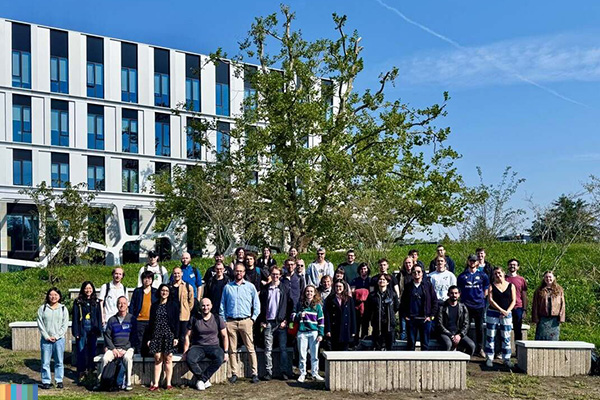LIV.INNO astrophysics students attend SWIFTcon meeting

Two LIV.INNO PhD students at the Astrophysics Research Institute at Liverpool John Moores University have recently attended SWIFTcon—the annual group meeting for the cosmological simulation code SWIFT—held at the University of Leiden in the Netherlands. SWIFTcon brought together computational astronomers from across the globe, providing a platform to share and discuss recent advancements in numerical models and methods within the context of the Swift astrophysical code.
LIV.INNO students Ryan Roberts and Emily Costello, along with their research group, attended the event which was focused on the ongoing development and implementation of SWIFT, a state-of-the-art code used in cosmological simulations. This gathering provided the students with the opportunity to meet their collaborators in person, exchange ideas, and discuss future research directions.
Emily contributed to the conference further with a talk titled “Characterising Black Hole Populations in FLAMINGO.” This research explores the mass distributions of black holes within the FLAMINGO cosmological simulation and investigates how these populations are influenced by different subgrid physics prescriptions, such as black hole repositioning algorithms and AGN feedback mechanisms. Her presentation stimulated conversations around the complexities of simulating black hole physics and advanced the collaborative efforts within the SWIFT community.
Emily said: “Attending SWIFTcon was a fantastic experience that allowed me to finally meet my collaborators in person, rather than just through a screen. Building those relationships has already been so essential to my research already, they’ve aided my understanding and sparked ideas that will be invaluable when writing my first paper. It was amazing to explore Leiden too, which was a beautiful city – I’m excited to return in the future.”
Ryan added: “The opportunity to meet a team of people at the forefront of state-of-the-art cosmological simulation development was an extremely exciting and motivating one. I enjoyed being able to network face-to-face with not only the SWIFT team, but also other PhD students working on similar projects to my own. I left Leiden with a renewed appreciation for the research being carried out within my field, as well as having a plethora of new ideas to apply to my own research”